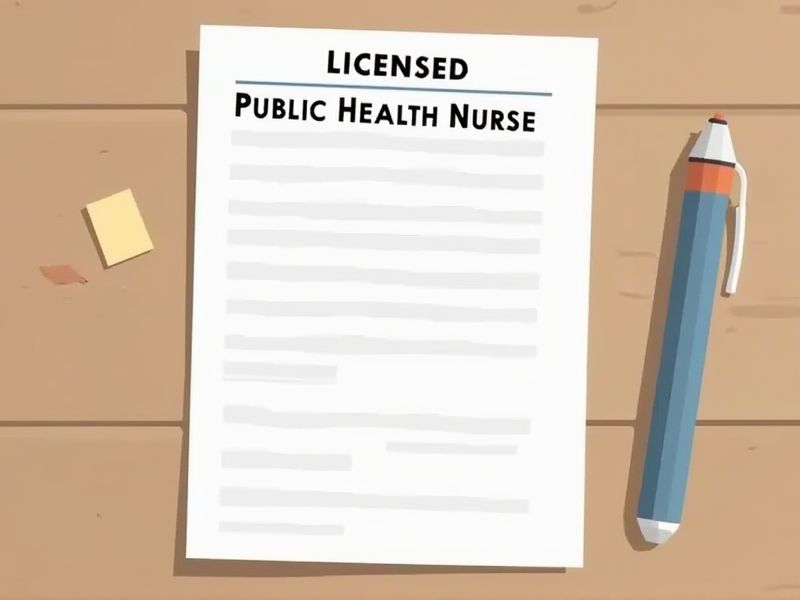
Licensed Public Health Nurses play a critical role in community health management, requiring specialized knowledge and skills. Certain certifications enhance their expertise, ensuring they are equipped to address complex public health challenges. These certifications often cover areas such as epidemiology, infection control, and health education, which are essential for effective public health practice. Below are some key certifications that a Licensed Public Health Nurse might need.
Active Registered Nurse (RN) License
Having an active Registered Nurse (RN) license ensures that a public health nurse possesses the foundational clinical skills essential for delivering effective community health services. The RN license indicates that the nurse has met standardized testing and educational requirements, assuring public trust in their competency. Regulatory bodies mandate active RN licensing as a prerequisite for specialized roles to maintain consistent healthcare standards. An active RN license enables public health nurses to have the authority and scope necessary for implementing and managing public health programs.
Certified in Public Health (CPH)
Obtaining the Certified in Public Health (CPH) credential enhances a licensed public health nurse's expertise by ensuring they have a comprehensive understanding of the core areas of public health. The certification can lead to increased job opportunities and career advancement, as it sets a recognized standard of knowledge and competence. It encourages continuous professional development, as maintaining the certification requires ongoing education and staying current with public health advancements. Having the CPH certification can also demonstrate a commitment to the profession, positively impacting public trust and credibility.
Public Health Nursing Certification (PHNC)
Obtaining a Public Health Nursing Certification (PHNC) enhances a licensed nurse's skills in addressing population health challenges. Certification signifies specialized knowledge, increasing a nurse's credibility and employability. The PHNC strengthens community trust by assuring adherence to evidence-based practices. Healthcare institutions prefer certified nurses for roles requiring expertise in public health interventions.
Basic Life Support (BLS) Certification
Public health nurses often encounter emergency situations where immediate care, such as Basic Life Support (BLS), can significantly increase survival chances. BLS certification provides the necessary skills for effective intervention during cardiac arrests or respiratory emergencies. Certification ensures that nurses are updated with the latest techniques and guidelines, promoting increased patient safety. It enhances their professional competency, ultimately fostering greater trust in healthcare systems.
Cardiopulmonary Resuscitation (CPR) Certification
CPR certification equips licensed public health nurses with essential skills to respond effectively in emergencies, thereby increasing survival chances for individuals experiencing cardiac arrest. Certification ensures that nurses remain updated on the latest CPR techniques and guidelines, enhancing the quality of care provided. It also meets regulatory requirements in many healthcare settings, ensuring compliance and standardization in life-saving protocols. Having CPR certification increases the overall safety and preparedness of healthcare teams, reinforcing public trust in health services.
Advanced Cardiac Life Support (ACLS) Certification
ACLS certification equips licensed public health nurses with the skills to handle cardiac emergencies, which are critical in high-stress healthcare settings. Cardiac issues can arise suddenly in communities, necessitating immediate, knowledgeable intervention. This certification also enhances their ability to collaborate effectively within medical teams during life-threatening situations. With growing emphasis on preventative care, understanding advanced life support also aids in community education and health promotion efforts.
Certified Health Education Specialist (CHES)
The need for a Certified Health Education Specialist (CHES) credential among Licensed Public Health Nurses arises from the requirement for evidence-based education strategies in public health initiatives. CHES certification equips nurses with advanced skills in planning, implementing, and evaluating health promotion programs. This enhances their ability to effectively communicate health information and advocate for community health. Integration of CHES expertise leads to improved health outcomes and efficient resource utilization in public health settings.
Infection Control Certification (e.g., CIC)
Infection Control Certification ensures that a licensed public health nurse has specialized knowledge vital for minimizing the spread of infectious diseases. With this certification, nurses are better equipped to develop effective infection prevention and control strategies, directly impacting public health outcomes. Properly trained nurses contribute to reducing healthcare-associated infections, which in turn lowers healthcare costs and improves patient safety. Certified knowledge in infection control enhances the credibility and competence of public health nurses in addressing and managing infectious disease threats.
Public Health Emergency Preparedness Certification
Public Health Emergency Preparedness Certification equips licensed public health nurses with essential skills to respond effectively to crises, enhancing community resilience. Certification ensures standardized knowledge across different public health professionals, facilitating coordinated responses in emergencies. It reduces the risk of mismanagement during public health threats by improving nurses' understanding of protocols and best practices. Nurses with certification can better educate and guide communities on preventative measures, decreasing the likelihood of widespread harm.
Community Health Worker Certification
Community Health Worker Certification enhances the skill set of a Licensed Public Health Nurse by equipping them with community-specific knowledge, increasing their effectiveness in local health initiatives. Certification facilitates improved communication with diverse communities, leading to better health outcomes and increased community trust. It ensures standardized competencies among healthcare workers, contributing to consistent care delivery and public health intervention strategies. In a continuously evolving healthcare landscape, certification aligns nurses with emerging public health trends and requirements, keeping them at the forefront of community health advancements.
Summary
You, as a Licensed Public Health Nurse, can expect enhanced credibility and professional recognition when obtaining additional certifications. This often leads to increased job opportunities and potential for career advancement. With specialized certifications, you are likely to gain deeper expertise, allowing you to address complex health challenges more effectively. Your earning potential may also increase as employers value your advanced skill set and commitment to ongoing education.
